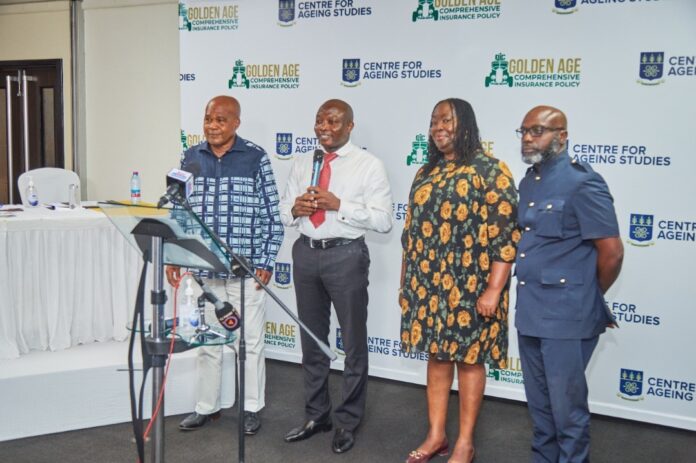
The Ministry of Gender, Children and Social Protection has given the strongest assurance yet of its commitment to having the Ageing bill – a comprehensive legal tool with a focus on the well-being and protection of older persons – passed into law in the near-term.
Despite the existence of a broad policy framework geared toward e welfare of the ageing – particularly with introduction of the National Ageing Policy in 2003 and its adoption in 2010 – the move toward legislation has stalled in recent years, prompting fears of increased vulnerability for the elderly.
But speaking at the launch of the inaugural National Ageing Summit – which is the brainchild of the Centre for Ageing Studies (CFAS) at the University of Ghana in partnership with Quality Life Insurance (QIC) – the Focal Person for Ageing at the Ministry of Gender, Children, and Social Protection, Felix Logah, said the passage of the bill is paramount in the ministry’s agenda – noting that he expects work to advance rapidly once a substantive minister has been approved by parliament.
“The bill will be given the required impetus once the minister-designate is confirmed, because all the relevant structures are already in place,” he assured.
Mr. Logah’s comments come on the back of a renewed wave of advocacy aimed at ensuring passage of the bill into law.
In her remarks, Director of the Centre, Professor Mavis Dako-Gyeke, said delays in passage of the Ageing bill have limited enforcement of some provisions for the protection of older persons.
“The Ageing bill is of very great concern to us at the Centre, and we believe that it needs to be passed now as it establishes the framework for rights of older persons and will ensure such rights will be upheld. The bill will guarantee enforcement and ensure that well-being and quality of life for older persons is not compromised,” CFAS’s director noted.
She is confident that the Summit, which is slated for December 2022 and has as its theme ‘Refining Ageing: Celebrating the Resiliency of the Older Persons’, will serve as a convergence point for all key stakeholders to press home the importance of having formal structures that cater to the ageing.
“Our overarching goal is bringing together policymakers, researchers, advocates and other stakeholders to deliberate on ideas, initiatives and regulations to make mainstream society a safe haven for older persons, and devise an appropriate framework for their welfare,” she said.
Also at the event, Country Representative of the United Nations Population Fund (UNFPA), Barnabas Yisa, in a speech read on his behalf warned of implications for the country’s social and economic development if concerns of the elderly are not adequately addressed.
He added that whatever measures are being developed to address their challenges must also consider the gender disparities which exist, even among older citizens.
“Older people suffer from food insecurity, social injustice and neglect, but disparities between older men and women exist at all levels. Older women suffer extreme poverty and face barriers to the acquisition of assets and access to health care. For elderly women, age and gender discrimination – for instance, the accusation of witchcraft – often lead to disempowerment, poor health outcomes, victimisation and even death,” he explained.
“Emergence of the COVID-19 pandemic exacerbated existing inequalities, and the existence of gaps in the legal framework continues to limit the opportunities for, particularly, older women to participate adequately in public decision-making on an equitable basis; and affects their ability to alleviate poverty even in old age,” the Country Rep added.
Highlighting the critical role of data in shaping policy, he said his outfit has partnered with Ghana Statistical Services (GSS) in the production and generation of data to provide new evidence to inform policies on the aged, adding that the UNFPA is also supporting GSS to produce a thematic report on the aged.
“Investing in data for the aged, and especially in its utilisation, is crucial to the development of Ghana; especially in the era of an evidence-based, technological and innovative world, and will ensure that no one is left behind,” Mr. Yisa stated.
Experts have said that as the national share of older persons continues to rise, primarily on account of improved healthcare provision, there is an urgent need to accelerate legislation, policies and programmes addressing age-sensitive services and facilities.
They warn there is a risk of derailing broader economic development due to the direct and indirect costs associated with an upsurge in this demographic segment – adding that if immediate action is not taken, the working population will be forced to deal with the negative consequences of a higher dependency ratio.
Ghana’s population is ageing in line with global trends, and now has one of the highest populations of older adults – 60-plus years – in sub-Saharan Africa. In 1960, 4.5 percent of the population was captured in this bracket; this number rose to 6.7 percent in 2010 and is projected to reach 9.8 percent by 2050.
In nominal terms, the elderly population has increased almost 10 times in the past six decades – from 213,477 in 1960 to 1,991,736 in 2021, according to the GSS, with 43.3 percent being men and 1,129,906 56.7 percent women. In a statement to mark the International Day of Older Persons, the Statistical Services pointed out that about a quarter of older persons in the country – most of which live in rural areas – are multi-dimensionally poor.
This comes as life expectancy in the country has soared from 57 years in 2000 to an average of 64 years in 2020, according to the World Health Organisation (WHO).









